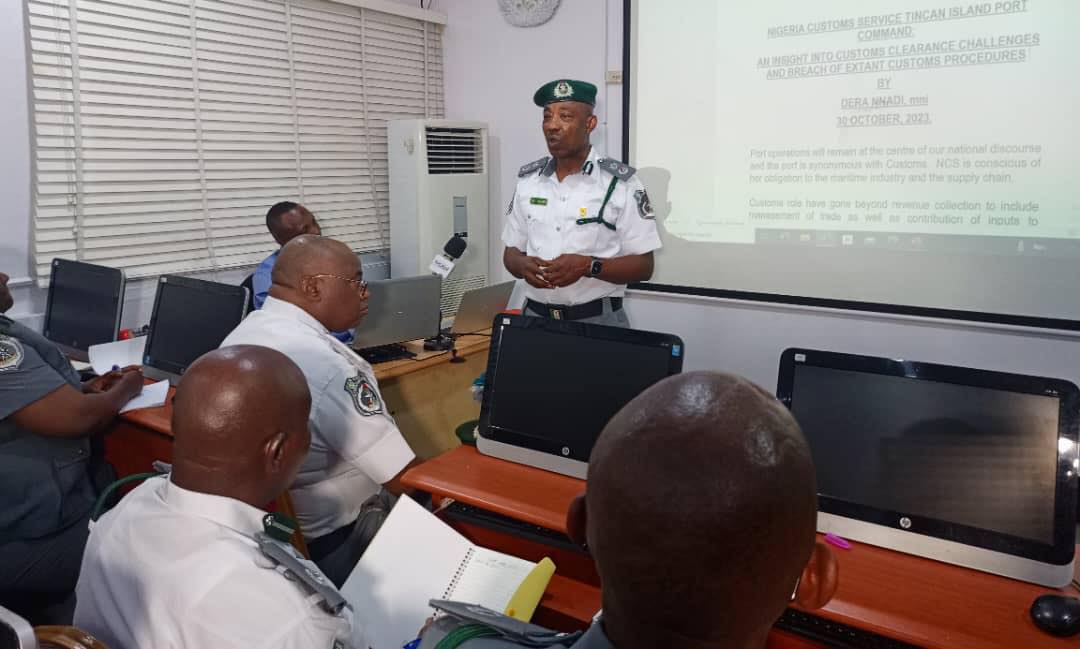
Clearing agents in the maritime industry have expressed mixed reactions about the the Time Release Study (TRS) recently launched by the Nigeria Customs Service (NCS) at the Tin Can Island Command of the service.
The TRS is an initiative aimed at measuring the efficiency and effectiveness of cargo clearance processes at Nigerian ports. The TRS is a global standard used to assess the time taken for goods to be cleared from ports, from arrival to exit.
Recall that the TRS was introduced at Tin Can port to address the long-standing issues of delays and inefficiencies in cargo clearance, which have hindered trade facilitation and economic growth.
The Comptroller General of Customs Adewale Adeniyi had in February 2024, during the launch, said the study aims to identify bottlenecks and areas for improvement, enabling the NCS to streamline processes and reduce clearance times to a maximum of 48 hours.
Reacting to the progress made so far with the TRS at Tin Can port, some clearing agents operating at the port who spoke with Shipping Position Daily welcomed the initiative, acknowledging its potential to enhance efficiency and reduce delays.
Others have, however, raised concerns about the implementation and effectiveness of the TRS, citing ongoing challenges with network issues, valuation, and corruption.
Ojo Peter Akintoye, a member of the Association of Nigerian Licensed Customs Agents (ANLCA), highlighted the difficulties faced at Tin Can Port due to network issues, which have hindered a proper assessment of the TRS. He also emphasized the need to address valuation issues and corrupt practices that hinder timely cargo clearance.
He said, “The recent network issues we have had at Tin Can cannot really help us to do a real assessment of the TRS at Tin Can. For the past one and a half weeks, we have been battling with the network.”
“Secondly, the issue of valuation is a big problem for us at Tin Can where they will raise outrageous duty and refer you to CPC, thereby causing delays in the time taken for cargo clearance. This is a big issue.”
“I know the CG meant well for the service, but what about those working under him? Do they really mean well? These are the issues,” he said.
On his part, Mr Clinton Okoro, Public Relations Officer of the Association of Professional Freight Forwarders and Logistics of Nigeria (APFFLON), expressed concerns about the functionality of the TRS, citing previous experiences with scanning machines that were introduced but did not yield desired results. He emphasized the need for effective implementation and minimizing human interface to achieve efficient cargo clearance.
“The TRS is a welcome idea, but implementation is another thing. None of these are functioning yet. They brought up the issue of scanning the other time, and that didn’t go well because the machines are not in the port. If you go for scanning, even though there is no dent on your image, the officers say the machines are not giving them what they want. This is supposed to at least minimize the human interface in the ports, but unfortunately, it is not.
“The TRS is not working because nobody has said he has cleared his cargo through the TRS. It seems it has been introduced. I have not cleared my consignment within 24 hours before. So it is not working, that is the truth,” he said.
Speaking also, Ugochukwu Nnadi, a chieftain of the National Association of Government Approved Freight Forwarders (NAGAFF), stated that the TRS is not working in practice, despite being on paper. He attributed this to customs officers’ discretionary powers and the lack of a functional system.
“The TRS is on paper, it’s not in practice. If the customs man doesn’t get what he wants, he’s on his own. He has his basis; it’s as simple as that. Everywhere, not just at Tin Can, it’s everywhere”
When asked how long it takes to clear consignment at the Tin Can port, he said, No,the Customs server is not helping issue. So you wouldn’t know who to blame, whether it’s the officer or the system. In fact, there was a time for almost two weeks, nothing was going on, no server. So they were also using that one as a case”, he said.
Also speaking, Mr Festus Ukwu, Secretary-General of the National Council of Managing Directors of Licensed Customs Agents, (NCMDLCA) acknowledged that it is too early to assess the TRS, but expressed optimism that its aims and objectives will be achieved over time.
“For the TRS, I cannot really assess it now. I believe it’s too early to assess it because it is not when you launch something that you start seeing the result. Gradually as time goes on, the aims and objectives will be achieved. Sometimes it might go the way they plan it, sometimes it might fail, but we pray it doesn’t fail.” he said.















